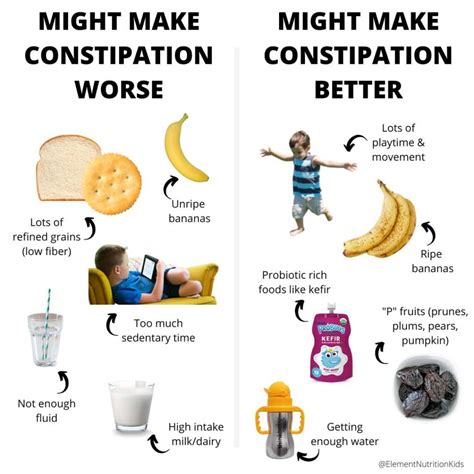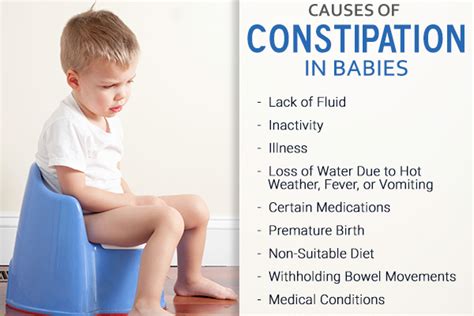Intro
Learn about constipation in 1-year-old babies, its causes, symptoms, and remedies, including dietary changes and bowel movement aids to ease infant constipation and promote healthy digestion.
Constipation is a common issue that affects many babies, including those around the age of one. It's essential for parents to understand the signs, causes, and treatments of constipation in their little ones to ensure they receive the best possible care. Constipation can be a source of significant discomfort and distress for babies, and if left untreated, it can lead to more severe health problems. As a parent, it's crucial to be aware of the signs of constipation and take prompt action to address the issue.
Babies around the age of one are still learning to navigate their digestive system, and constipation can occur due to various reasons. One of the primary causes of constipation in babies is a low-fiber diet. As babies transition from breast milk or formula to solid foods, their digestive system may struggle to adapt to the new foods. Additionally, babies may not be getting enough fluids, which can lead to hard, dry stools that are difficult to pass. Other factors, such as changes in routine, travel, or the introduction of new foods, can also contribute to constipation in babies.
It's vital for parents to recognize the signs of constipation in their babies. These signs can include hard, dry stools, fewer bowel movements than usual, straining or grunting during bowel movements, and blood in the stool. If parents notice any of these signs, they should consult with their pediatrician to determine the best course of action. The pediatrician may recommend dietary changes, such as increasing fiber intake or offering more fluids, to help alleviate constipation. In some cases, the pediatrician may prescribe medication to help soften stools or stimulate bowel movements.
Understanding Constipation in 1-Year-Old Babies

Signs and Symptoms of Constipation
The signs and symptoms of constipation in 1-year-old babies can vary, but common indicators include: * Hard, dry stools * Fewer bowel movements than usual * Straining or grunting during bowel movements * Blood in the stool * Abdominal distension or bloating * Irritability or fussiness * Loss of appetite Parents should be aware of these signs and consult with their pediatrician if they notice any changes in their baby's bowel movements or overall behavior.Causes of Constipation in 1-Year-Old Babies

Dietary Factors
Dietary factors can significantly contribute to constipation in 1-year-old babies. Some common dietary factors include: * Low-fiber diet * Dehydration * Introduction of new foods * Food allergies or intolerances * Excessive consumption of dairy products Parents should be aware of these dietary factors and make adjustments to their baby's diet as needed to prevent constipation.Treatments for Constipation in 1-Year-Old Babies

Home Remedies
There are several home remedies that can help alleviate constipation in 1-year-old babies, including: * Increasing fluid intake * Adding fiber-rich foods to the diet * Using a warm bath to relax the muscles * Gently massaging the baby's abdomen * Using a rectal thermometer to stimulate bowel movements Parents should consult with their pediatrician before trying any home remedies to ensure they are safe and effective.Prevention of Constipation in 1-Year-Old Babies

Dietary Strategies
Dietary strategies can play a significant role in preventing constipation in 1-year-old babies. Some dietary strategies include: * Offering fiber-rich foods, such as prunes or peaches * Avoiding foods that can cause constipation, such as dairy products * Encouraging a balanced diet that includes a variety of fruits, vegetables, and whole grains * Offering plenty of fluids, such as breast milk or formulaConclusion and Next Steps

We invite you to share your experiences and tips for managing constipation in 1-year-old babies in the comments below. If you have any questions or concerns, please don't hesitate to reach out to us. We're here to help.
What are the common signs of constipation in 1-year-old babies?
+The common signs of constipation in 1-year-old babies include hard, dry stools, fewer bowel movements than usual, straining or grunting during bowel movements, and blood in the stool.
How can I prevent constipation in my 1-year-old baby?
+You can help prevent constipation in your 1-year-old baby by offering a balanced diet that includes fiber-rich foods, encouraging physical activity, establishing a regular bowel routine, and avoiding foods that can cause constipation.
What are some home remedies for constipation in 1-year-old babies?
+Some home remedies for constipation in 1-year-old babies include increasing fluid intake, adding fiber-rich foods to the diet, using a warm bath to relax the muscles, gently massaging the baby's abdomen, and using a rectal thermometer to stimulate bowel movements.
